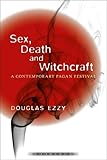Sex, death and witchcraft : a contemporary pagan festival / Douglas Ezzy.
Material type: TextPublisher: London : Bloomsbury UK, 2014Description: 1 online resourceContent type:
TextPublisher: London : Bloomsbury UK, 2014Description: 1 online resourceContent type: - 9781472522016
- 147252201X
- 9781472522467
- 147252246X
- 9781472533630
- 1472533631
- 9781472594624
- 1472594622
- 9781472527585
- 1472527585
- 299.94 23
- BP605.N46
- online - EBSCO
| Item type | Current library | Call number | URL | Status | Notes | Barcode | |
|---|---|---|---|---|---|---|---|
 eBook
eBook
|
Biblioteca "Angelicum" Pont. Univ. S.Tommaso d'Aquino Nuvola online | online - EBSCO (Browse shelf(Opens below)) | Online access | Not for loan (Accesso limitato) | Accesso per gli utenti autorizzati / Access for authorized users | (ebsco)704381 |
Browsing Biblioteca "Angelicum" Pont. Univ. S.Tommaso d'Aquino shelves, Shelving location: Nuvola online Close shelf browser (Hides shelf browser)

|

|

|

|

|

|

|
||
| online - EBSCO Bloomsbury companion to Hindu studies / | online - EBSCO Unity in diversity : mysticism, messianism and the construction of religious authority in Islam / | online - EBSCO The Dead Sea scrolls and Pauline literature / | online - EBSCO Sex, death and witchcraft : a contemporary pagan festival / | online - EBSCO China, Christianity, and the question of culture / | online - EBSCO The Coptic question in the Mubarak era / | online - EBSCO A prophet like Moses : prophecy, law, and Israelite religion / |
Includes bibliographical references and index.
Introduction -- A Witches' Sabbat -- Paganism, Witchcraft and Faunalia -- 1 Soul -- Introduction -- Soul: Phoebe -- Sauvage -- Religion is not what you believe -- Lewis -- Religion as performative relationality -- * Vignette: Therion -- 2 Ritual -- Temporal and geographical liminality -- Material liminality -- Liminal culture: Between the worlds -- Iconic consciousness -- Liminality and somatic knowing -- Community and communitas -- Liminal, but not a passage rite -- Authenticity and ritual -- 3 Death -- Preparation -- Opening the door to the underworld -- The ordeals -- The underworld -- Embodied liminality -- 4 Shadow -- Shadow work at Faunalia -- Mortality and monsters -- Pagan moral ontology -- Emotional authenticity -- * Vignette: René -- 5 Baphomet -- A Witches' Sabbat -- Pre-briefing and preparation -- The procession and elements -- Trance -- The bindings and beast chants -- Baphomet appears -- Eroticism -- Marilyn and John -- Lewis -- Endings -- 6 Ethics -- Baphomet: A Pagan deity -- Baphomet, shadow and authenticity -- Desire and ethics -- Solvé Coagula -- Andrew -- Mistakes -- Relational ethics -- * Vignette: Phoebe -- 7 Religion -- Aesthetics -- Dionysian ritual -- Baphomet is 'all' -- Liminal flow -- Transcendence and religion -- Religious experience -- Religion redefined -- Conclusion.
Faunalia is a controversial Pagan festival with a reputation for being wild and emotionally intense. It lasts five days, 80 people attend, and the two main rituals run most of the night. In the tantalisingly erotic Baphomet rite, participants encounter a hermaphroditic deity, enter a state of trance and dance naked around a bonfire. In the Underworld rite participants role play their own death, confronting grief and suffering. These rituals are understood as "shadow work"--A Jungian term that refers to practices that creatively engage repressed or hidden aspects of the self. Sex, Death and Witchcraft is a powerful application of relational theory to the study of religion and contemporary culture. It analyses Faunalia's rituals in terms of recent innovations in the sociology of religion and religious studies that focus on relational etiquette, lived religion, embodiment and performance. The sensuous and emotionally intense ritual performances at Faunalia transform both moral orientations and self-understandings. Participants develop an ethical practice that is individualistic, but also relational, and aesthetically mediated. Extensive extracts from interviews describe the rituals in participants' own words. The book combines rich and evocative description of the rituals with careful analysis of the social processes that shape people's experiences at this controversial Pagan festival


